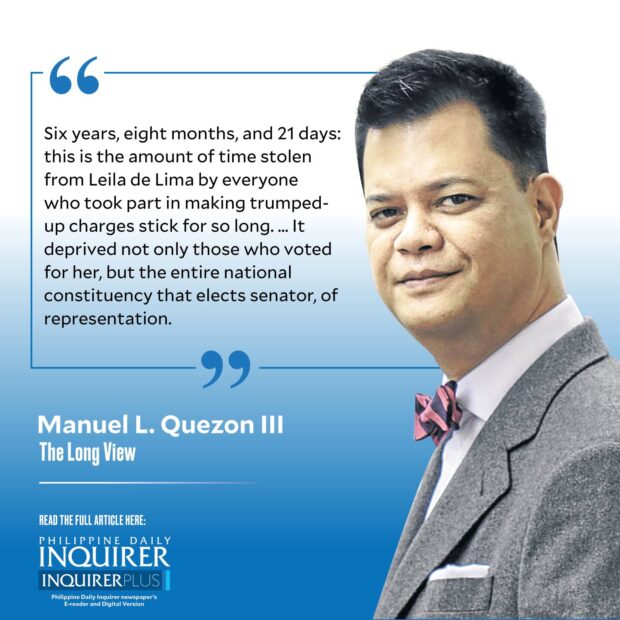Daylight robbery

Six years, eight months, and 21 days: this is the amount of time stolen from Leila de Lima by everyone who took part in making trumped-up charges stick for so long. Case after case ended up dismissed as witnesses recanted, until at last, only one charge is left, and she has finally been granted bail. De Lima has never been convicted but has already served time for taking her duties as a lawyer, a member of the Cabinet, and the Senate, seriously.
The time stolen from De Lima was stolen from the Filipino people, too. It deprived not only those who voted for her, but the entire national constituency that elects senator, of representation. It likely robbed her of a second term, as well, as she took a reputational hit from the attacks mounted by former president Rodrigo Duterte and his entire infrastructure.Unlike the many unknown citizens whose value lay in their being liquidated in the dark with little to no trace as to who, specifically, did it, the liquidation of Duterte’s political enemies took place in broad daylight and with him taking ownership every step of the way. The reason for this is that they were in the nature of public, political, executions as a deterrent to either opposition, investigation, or mere independence. For new money, there was Lucio Tan, for old, the Zobels; for print, there was this newspaper, for TV and radio, ABS-CBN; for online journalism, Rappler; for local governments, a small sampling of mayors, and for the legislature, there was De Lima.
Of all of them, it was De Lima who’d dared to investigate Duterte and thereby do justice to those liquidated in his so-called “war on drugs,” and it was she who bore the brunt of his fury. Some say the only thing she was spared, was a bullet or knife to her throat; but it very nearly ended up that way, in October 2022.
Of course, his hatred of her predated her joining the senate. It dated back to before she even joined the Cabinet. It dated back to when she was in the Commission on Human Rights. But it very nearly became an existential threat to Duterte once De Lima became a senator, had subpoena powers, and could shine a national spotlight on the question of liquidations. The hearings of the committee led to testimony that, to this day, are at the heart of ongoing investigations by the International Criminal Court. The hearings couldn’t be allowed to continue with De Lima at the helm.
Here, the chamber she was elected to be part of, turned its collective back on her and did their chamber a disservice as a result. For this reason, the senators voted to oust her from the committee chairmanship didn’t merely engage in a routine shuffle of committee heads, they raised a white flag of surrender when they saw how angry De Lima made the then-chief executive. For this reason, Koko Pimentel, Tito Sotto, Alan Cayetano, Migz Zubiri, Ping Lacson, Cynthia Villar, Sherwin Gatchalian, Gringo Honasan, Sonny Angara, Joel Villanueva, Dick Gordon, Nancy Binay, JV Ejercito, Manny Pacquiao, Loren Legarda, and Grace Poe betrayed the fundamental duty of every senator (and, indeed, the reason for being of the senate) to think nationally instead of parochially, and to effectively provide a balance to the chief executive as the only other officials with a mandate from the same national constituency.
Duterte’s point had been made and the damage done, when others tried to belatedly do a De Lima. Dick Gordon, who was put in her place, vowing a more “objective” investigation, would, eventually, edge toward opposing Duterte but gain nothing politically from it. Only four senators voted against her ouster and thus, didn’t soil themselves: Frank Drilon, Risa Hontiveros, Kiko Pangilinan, and Bam Aquino. Two more abstained: Ralph Recto and Antonio Trillanes IV, and two more didn’t vote: Chiz Escudero (and of course, De Lima herself). These soiled themselves a little less.
Sen. Bato dela Rosa reacted to De Lima being able to post bail, by saying he respected the decision of the court but felt compelled to ask why the cases against De Lima hadn’t been dismissed during the time of Duterte if, in fact, the cases were weak. Reading between the lines, what he’s really suggesting is that the difference between Duterte and President Marcos is that one president had the power and the interest, to suspend the full operations of the law, while the other seems uninterested in spending political capital to keep De Lima in jail. And there lies the vexing conclusion we’re left with.
In the (as of now) cold war between the Dutertes (the old man and to a certain extent, the daughter) and Gloria Macapagal Arroyo (who’d also been reportedly insistent on De Lima being detained as her own revenge for being charged and detained) and the Marcoses (meaning the President and the First Lady but not senior sister-senator Imee, who remains a “Dutertista”), De Lima’s detention was the continuing maintenance cost for the now-defunct alliance.




















